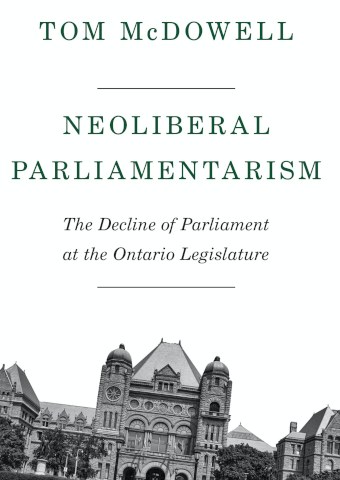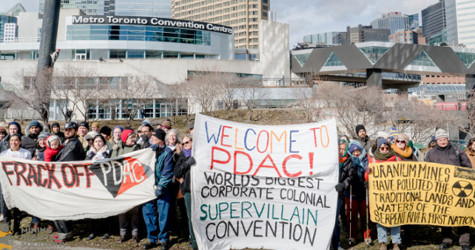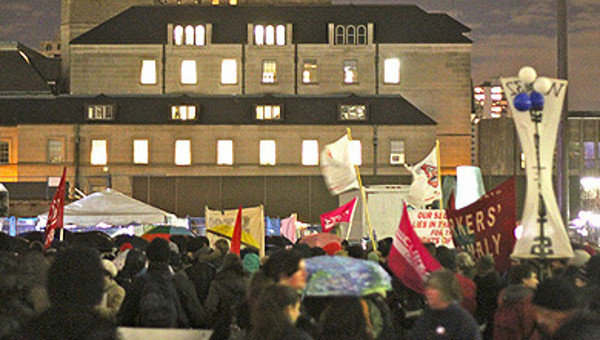Ontario’s Strong Mayor Reforms: A New Shell for Urban Neoliberalism
Last month, Ontario’s Lieutenant Governor Elizabeth Dowdeswell affixed her signature to Bill 39, the Better Municipal Governance Act, conferring Royal Assent upon the most substantial reconstruction of local democracy since Confederation.
Along with Bill 3, the Strong Mayors, Building Homes Act, the legislation implements a strong mayor system in the cities of Ottawa and Toronto, giving the mayors of these cities the ability to pass and repeal by-laws with as little as one-third support of city council.
While these reforms, which would make Ontario’s mayors the most powerful of any jurisdiction in North America, have been fiercely opposed by advocates of urban democracy, the reasons for the Ford government’s decision to resort to such unprecedented measures remain poorly understood.
One popular theory has been to assume they are a “revenge plot” by Premier Doug Ford for having lost the 2014 Toronto mayoral election.
However, the evidence suggests that the transition to a strong mayor system in Ontario is neither the result of an interpersonal dispute, nor the action of a uniquely radical government. Rather, they are consistent with a broader ruling class objective, occurring elsewhere around the world, to embed neoliberalism’s market-based approach in the fabric of the state and society by weakening democratic institutions and concentrating power in the executive.
Consequently, they should be understood as part of a wider reimagination of legislative institutions in the direction of authoritarian state forms under neoliberalism, providing the marketplace with long-term institutional certainty and predictability during an era of rising political volatility.

Strong Mayor Reforms as a Longstanding Ruling Class Objective
Ruling class support for strong mayor powers can be dated back at least a decade in Ontario as part of an effort to cultivate conditions for the “competitive city” in the age of global capitalism.
A 2008 report from Toronto’s Economic Competitiveness Advisory Committee, a panel comprised of councillors and business leaders, for instance, recommended strengthening the authority of the mayor on the grounds that the existing weak mayor model was prone to being politicized by city councillors and activists.
The report’s findings were endorsed by then Premier Dalton McGuinty who claimed that it was “really important opportunity for council to give the mayor of the day the authority he needs,” which was “lacking at this point in time.”
Toronto’s mayor in 2008, David Miller, also demonstrated a willingness to utilize the expanded powers on the grounds of economic rationalism, suggesting that “there’s no organization of our size in the world anywhere, government or private, that would have the people who run the operation report to 45 people.”
However, political circumstances in 2008 were not yet appropriate to actualize a change of this magnitude. Transforming Ontario’s system of municipal democracy would require a more compelling public explanation.
Building a Populist Case for Executive Dominance
By 2022, however, conditions had sufficiently ripened. A housing affordability crisis in the context of a rising populist zeitgeist around the world, created a catalyst for the Ford government to build a case for “bold action” of the kind that could only be achieved through a dominant executive.
To achieve this, the government employed a populist strategy that weaponized these contradictions against democratic institutions themselves, assigning responsibility to them as instruments of radical leftist city councillors, used to deliberately obstruct economic development.
In legislative debate, government MPPs portrayed local councils under the weak mayor model as too occupied with ideology and politics to adequately respond to the demands of the marketplace, leading to a “political logjam.” There were simply “too many hands in the pot, with too many layers of bureaucracy, studies, permits” delaying housing development.
In contrast with the idea of NIMBYism (Not In My Back Yard), Minister of Municipal Affairs and Housing Steve Clark introduced the concept of BANANAism, or “Build Absolutely Nothing Anywhere Near Anyone,” to describe leftist city councillors and community activists.
The strong mayor reforms were designed to “stop the weaponization” of democratic processes by the left, ensuring that the “BANANA group” no longer has the ability to “delay, delay, delay.”
It was therefore necessary to streamline legislative institutions, concentrating power in the mayor’s office, as a direct means of insulating the marketplace from democratic interference.
Market outcomes, rather than scrutiny, accountability, or compromise, become the principal unit of measurement for democracy. Meanwhile, efficient, technocratic executive rule is presented as a democratic ideal.
A New Shell for Urban Neoliberalism
Ontario’s strong mayor reforms, then, must be grasped, not as an isolated event, or the consequence of an interpersonal conflict, but rather a structurally conditioned class relation, in which neoliberalism has sought to secure its dominance by assuming increasingly authoritarian forms.
Ontario’s strong mayor reforms are a direct response to institutional resistance to neoliberal reforms; a way of transcending the interference of the democratic majority that they claimed was the cause of the crisis.
Rather than understanding strong mayor reforms as a fringe, right-wing scheme, then, they should be grasped as consistent with neoliberalism’s inner logic, and part of a ruling class effort to insulate neoliberal policies from democratic interference.
This has been evidenced by the degree to which centrist, third way municipal leaders, who normally reject the Ford government’s divisive brand of populism, have already begun to embrace a similar political narrative after the province announced it would extend strong mayor powers to other cities.
Toronto Mayor John Tory has justified assuming the powers, and asked the province for even stronger authority than it initially intended, on the grounds that they are required to “get more housing built as quickly as possible,” and to “avoid NIMBYism.” The mayors of Mississauga and Brampton, meanwhile, have utilized a similar logic in their public statements, imploring the government to make institutional reforms to reduce “red tape” and “redundancy” in legislative and administrative processes.
By implementing a system of permanent minority rule, and establishing a new political shell for neoliberalism, the Ford government has designed the necessary institutional scaffolding to set in motion a new, more aggressive phase of urban restructuring, directed from the centre. •
This article first published on the Canadian Dimension website.






